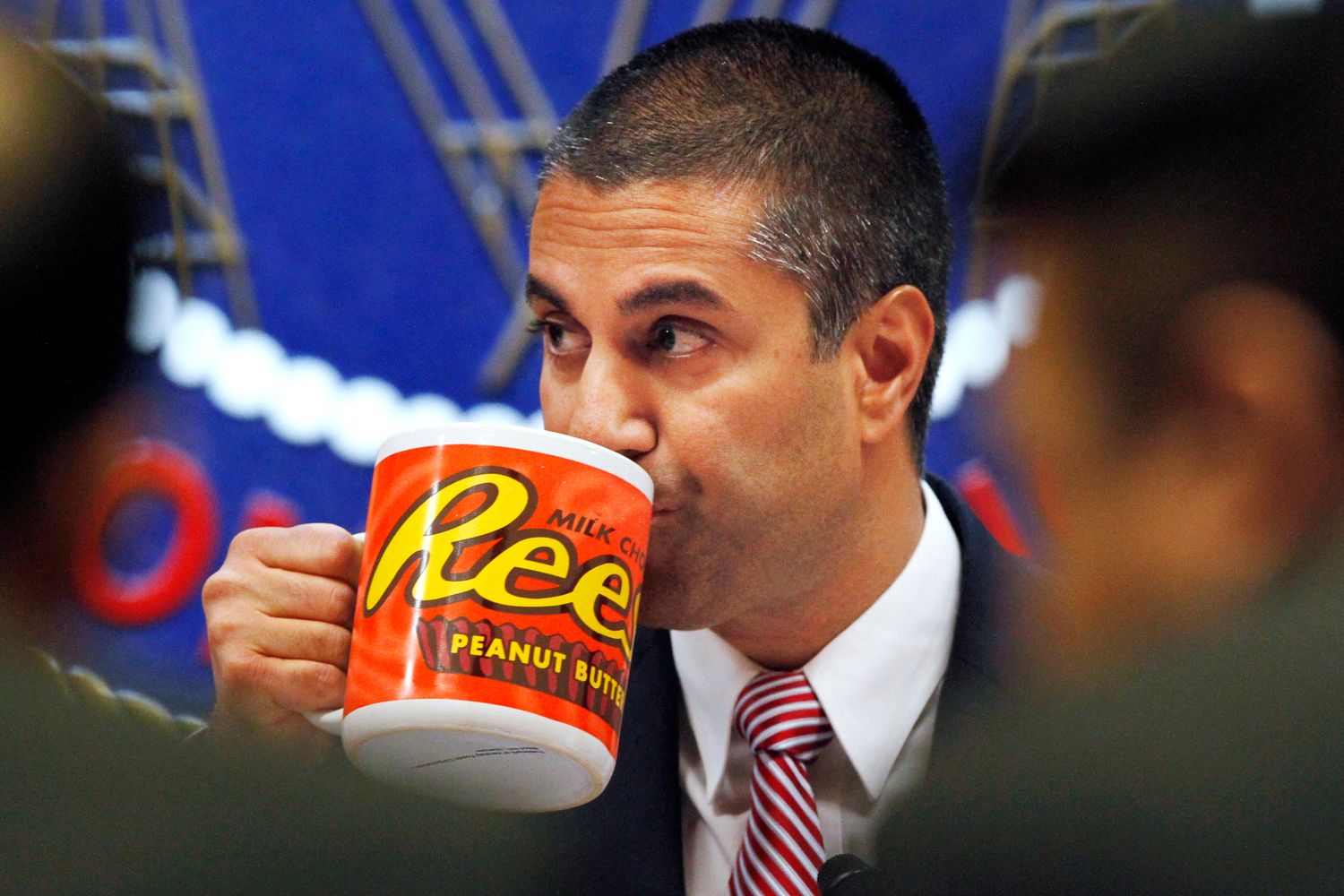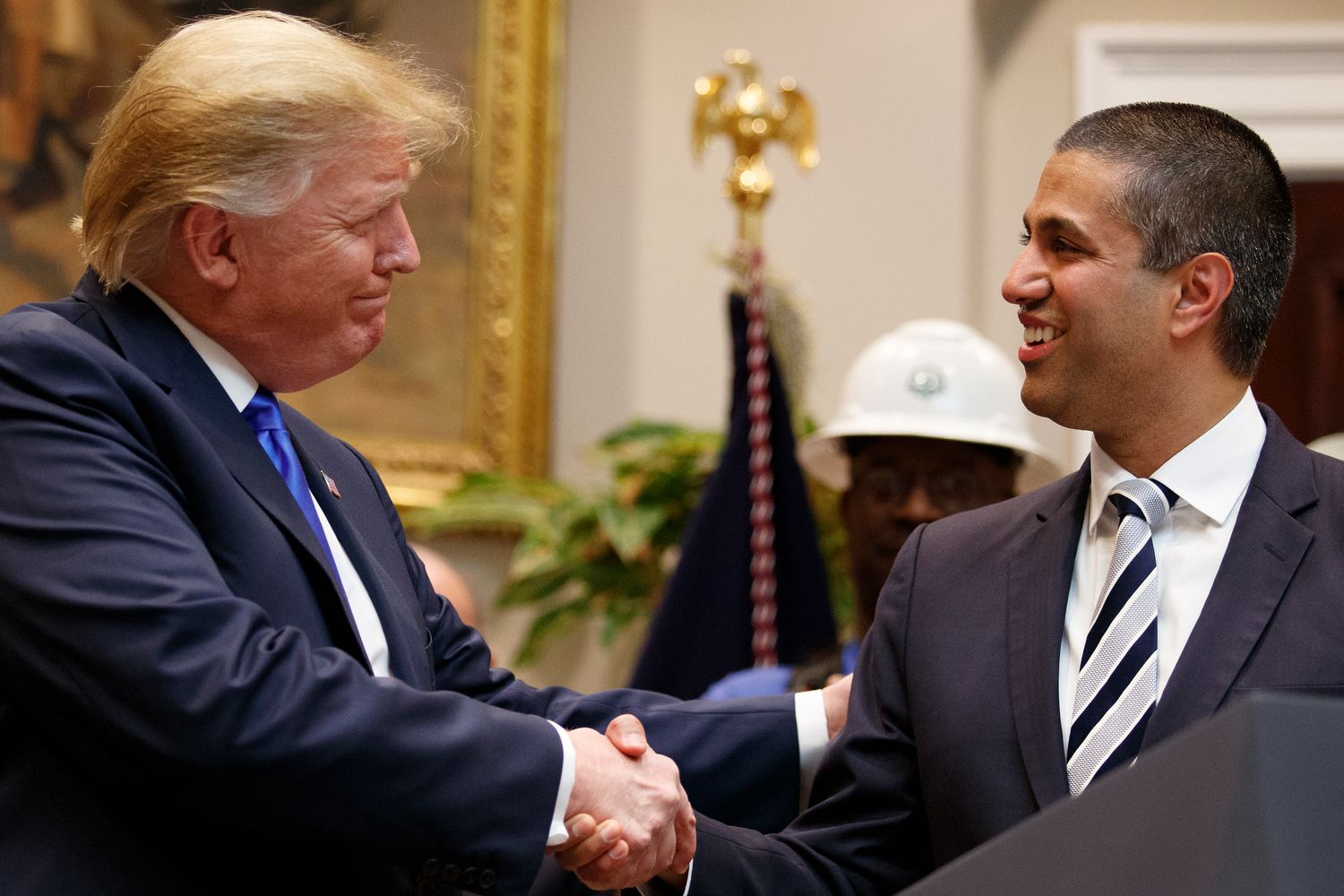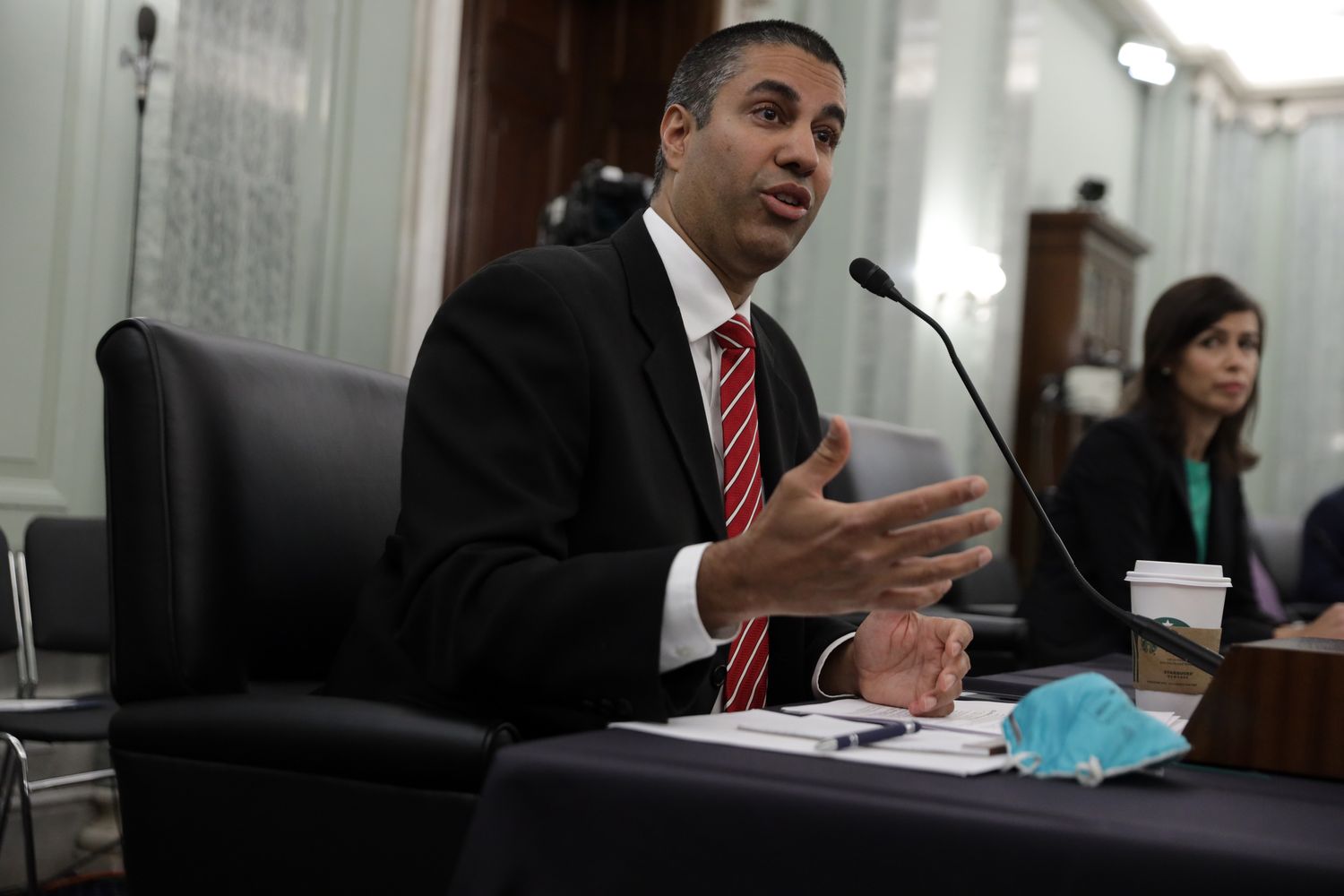
FCC chief Ajit Pai is angering a lot of powerful people as his chairmanship hits its fourth and potentially final year.
The Pentagon, the Commerce Department and the Department of Transportation. Electric utilities, airlines and the auto industry. Public safety officials and weather forecasters. Top lawmakers of both parties, including an ally of President Donald Trump’s who controls the FCC’s purse strings on the Senate Appropriations Committee.
And most of that is because of actions Pai has taken this year.
Every FCC chair makes decisions that draw criticism, from judging proposed mergers by broadcasters and cellphone companies to setting rules for net neutrality and robocalls. But the barbs coming Pai’s way have multiplied in recent months as he leads the commission in divvying up billions of dollars’ worth of wireless spectrum for a new generation of Wi-Fi and 5G wireless service — moves that are leaving a lengthening trail of winners and losers and putting Pai’s decision-making and career experts under the microscope.
The clear winners include Comcast, Facebook, AT&T and other Silicon Valley and telecom titans that say Pai’s policies will help the U.S. vie with China for technological supremacy. To his allies, Pai is heroic for taking on parochial interests keeping America from making the objectively best uses of its digital resources.
To his foes, however, he’s going rogue in ways that waste taxpayer money and could endanger public safety.
Some of them are expressing their criticisms of Pai in deeply personal terms.
“I wouldn’t take him with me to buy a car because he’d pay full sticker price and then try to give the salesman a bonus,” Senate appropriator John Kennedy (R-La.) said earlier this year, criticizing Pai’s plan to offer satellite operators billions of dollars to give up their airwaves for 5G. After Pai approved another 5G plan over the Pentagon’s objections, Senate Armed Services Chair Jim Inhofe (R-Okla.) hinted that “when people try to push bad policy through in the middle of a crisis, without much coordination with seemingly anyone else, it makes me wonder about their motives."
Critics blame a tunnel-vision regulatory culture that they say Pai has leaned into as agency chief.
The FCC embodies “very much a regulatory capture mindset” and “arrogance,” said Joy Ditto, who recently led the Utilities Technology Council in an unsuccessful airwaves fight with the commission on behalf of electric utilities. She accused the agency of putting its faith in tech and telecom companies’ promises of improved internet connections, at the expense of safety concerns from other spectrum-dependent industries.
“They literally believe in their heart that nothing that we said is true … that’s just very dangerous thinking,” said Ditto, now the CEO of the American Public Power Association, in an interview. “The impression was ‘We’re smarter than you, you don’t really know what you’re talking about because you don’t have our level of expertise.’”
Similar complaints have come from Trump’s Defense and Commerce departments — despite the praise Pai’s decisions have received from administration leaders like Attorney General William Barr and White House economic adviser Larry Kudlow.
Sen. Maria Cantwell (D-Wash.), the top Democrat on the Commerce Committee, upbraided Pai during a June 24 oversight hearing for siding against federal experts on battles over weather forecasting, aviation, transportation safety and national security. She stared down the agency chief as she rattled off her concerns, then laughed in seeming exasperation and told him that the FCC shouldn’t be the "default agency" to decide contentious calls in a vacuum.
"It seems to be that the agency has narrowed its interest in the standard for public broadband policy," Cantwell lamented. "Today the FCC dismisses national priorities and defaults to the belief that the highest and best use of spectrum is always terrestrial broadband."
Senators continued to grill Pai over similar issues throughout the hearing, which stretched past three hours — prompting the sometimes heated agency chief to scoff over what he dubbed "absolute nonsense" from critics like the Pentagon.
‘Driven by the engineering’
Pai dismisses much of the criticism, telling POLITICO during a June news conference that he and his agency have to make tough calls because of a lack of readily available airwaves. He emphasized the agency’s mandate to free up the communications resources for the private sector — a process he said is motivated by objective, expert analysis and includes all necessary consultation with others.
"We’ve been driven by the engineering," Pai said. "Not the politics, not the press releases, but what are the facts?"
"That is what 5G leadership is, focusing on the facts and coming up with a solution that delivers better return on the value to the American people for the resource that belongs to the American people," added Pai, who has spent years pushing the goals of speeding ahead advanced wireless networks and rural broadband service.
It doesn’t hurt, however, that Pai’s effort has the strong backing of the president. At a White House speech in the spring of last year, Trump stood with Pai to his right, applauding the agency chief’s "fantastic job" and making his 5G mandate clear.
"The race to 5G is a race America must win,” Trump said. “My administration is focused on freeing up as much wireless spectrum as needed.” Then he ribbed Pai about the possibility of pushing the effort even further: "I guess at some point we’re going to be talking about number 6," Trump said. "You think that’s true, Ajit?"
Pai, who became a commissioner in 2012, found himself embroiled in partisan tussling soon after Trump elevated him to chair in January 2017. Defying death threats and Democratic outcry, he repealed Obama-era policies such as the FCC’s old media ownership restrictions and net neutrality regulations — defending the latter decision by starring in a deliberately dorky video designed to go viral. If his policies drew attention, so did the “cartoonishly large” Reese’s coffee mug he drank from during the net neutrality vote.
But as the airwaves are squeezed by his latest policy moves, Pai is alienating sectors beyond the usual communications players. These more complicated spats don’t fall along traditional partisan lines, and sometimes put Pai at loggerheads with Trump allies like Defense Secretary Mark Esper, Transportation Secretary Elaine Chao and top Hill Republicans.

An April vote to open an entire band known as 6 GHz for Wi-Fi drew applause from cable giants like Comcast and Silicon Valley titans like Facebook. But electric utilities and public safety officials cried foul, saying it could disrupt their use of the same airwaves for critical infrastructure services.
That same month, Pai bucked the bulk of the Trump administration by approving a plan by the Virginia satellite company Ligado Networks to repurpose its existing airwaves for 5G service — a project that the Pentagon and DOT say could upend the nation’s GPS signals. He also overrode objections from the DOT and automotive interests in advancing a plan to allow Wi-Fi service in a slice of spectrum in the 5.9 GHz band that had been set aside for vehicle safety.
In the coming months, the FCC is expected to hold votes completing the transportation plans and addressing unresolved issues in the 6 GHz Wi-Fi debate.
Spectrum divides multiply
The groups on the losing ends of these fights complain that Pai and his agency are ignoring their valid concerns.
“All of the pleas of safety experts in transportation … we have effectively been shut out of the discussion,” Shailen Bhatt, who represents automotive and transportation interests as CEO of the Intelligent Transportation Society, told POLITICO. “I don’t understand why appropriate respect and consideration is not being given to the U.S. Department of Transportation.”
Senate Energy and Natural Resources Chair Lisa Murkowski (R-Alaska) lamented that Pai took seven months to reply to one of her letters in which she voiced concerns about how his airwaves agenda might squeeze utilities and emergency responders. She suggested the delay was because Pai “failed to adequately cooperate or consult with these entities.”
Following the FCC’s Ligado approval, the Pentagon also complained about feeling ignored.
“There was not a give and take, a back and forth that we typically go through,” DoD Chief Information Officer Dana Deasy told Senate Armed Services lawmakers during a May 6 hearing probing the FCC’s Ligado approval.
The Commerce Department’s National Telecommunications and Information Administration, on behalf of the executive branch, has asked the FCC to redo its Ligado’s decision, suggesting that Pai’s sign-off "represents an unexplained break from the healthy respect that NTIA and the executive branch have generally received from the Commission."
Pai has repeatedly sought to tamp down such fears and challenged some of these narratives. Regarding Ligado, he told Congress that the FCC had reached out to top Pentagon officials prior to announcing his proposed approval. In June, he received a briefing from Defense, Transportation and Commerce officials, which included classified information from defense officials.
In speeches and news conferences, Pai said he seriously vets critics’ objections, even when commission votes don’t concede to them.
His allies agree.
“We are asked to make the tough calls," Republican FCC Commissioner Mike O’Rielly said during a recent event.
Pai has won plenty of praise from traditional telecom analysts and observers, including some public interest groups that slammed his earlier deregulatory moves. They said the Pentagon, auto industry and utilities represent overly cautious hoarding of airwaves, and that Pai is brave to confront these turf wars. All five commissioners voted unanimously on most of these spats.
“The FCC is the expert agency that’s charged with making these decisions,” said Ligado CEO Doug Smith, who has suggested that the Pentagon’s campaign against his company’s 5G plans contradicts objective analysis from within the administration (a case receiving some validation from internal emails obtained by POLITICO). “They’re an independent body. They have to balance all the different competing interests.”
The advocacy group Public Knowledge, which receives some funding from Ligado and tech and telecom interests, argued that people should defer to the FCC’s engineering expertise, calling that "key to our success" in 5G. They led a letter rallying groups behind that idea.
A split administration
A widely acknowledged administration civil war over the airwaves, meanwhile, is making Pai’s job harder.
In the U.S., the FCC regulates commercial airwaves while the Commerce Department’s NTIA is supposed to oversee federally held wireless spectrum — and help mediate some of these fierce 5G fights. But the NTIA has lacked a Senate-confirmed leader for more than a year, and Cabinet agencies like the Pentagon and DOT have grown more outspoken about their spectrum grievances.
The dysfunction has caused some to argue the whole system may be busted and require creation of a brand-new government agency.
A Commerce Department advisory group is preparing a report contemplating such a possibility. “We generally reached agreement that the country’s current approach for managing the use of spectrum is no longer effectively serving the needs of the entire stakeholder community,” Jennifer Manner, a satellite executive preparing that report, told advisory group colleagues in April.
Even so, Pai should have clued in the executive branch and industry stakeholders when formulating the priorities in his 5G strategies, concluded a Government Accountability Office report issued at the end of June, questioning a lack of measure benchmarks driving Pai’s agenda and a set of ambitions seemingly developed in a silo.
One challenge is disagreement over what data really counts. Ditto, the utility industry representative, once urged the commission and the Federal Energy Regulatory Commission to agree to hash out the differences between telecom and utility interests — but said that idea went nowhere. “The first time I went to kind of float that idea to some FCC staff, it was like I was suggesting killing their firstborn,” she said.
Still, the FCC has since shown some openness. O’Rielly wrote the DOE in June with Pai’s blessing, proposing an interagency partnership on airwave efficiency.
But Ditto counts herself among those who say radical FCC overhaul may be the only solution.
“I don’t think it can continue in its same structure because we’re going to keep having these misguided proposals put out there that are going to put our country back,” she said. “I think ultimately you’d need legislative changes.”

President Pai?
Pai’s own future, meanwhile, is an open question amid widespread expectation that he’ll depart if Joe Biden wins the White House in November. Even if Trump wins reelection, many expect Pai will step aside before being forced to leave following his term’s expiration in 2021.
Many former FCC leaders went on to represent industries that benefit from the commission’s decisions under Pai: Former Chair Kevin Martin is a top lobbyist for Facebook; former Chair Michael Powell heads cable industry trade group NCTA; Meredith Attwell Baker leads wireless trade group CTIA and Jonathan Adelstein heads the Wireless Infrastructure Association; former Commissioners Robert McDowell and Mignon Clyburn helped shepherd through T-Mobile’s recent high-profile merger.
Pai himself is a former Verizon lawyer, a stint that many of his critics are happy to invoke. But the traditional telecom players say they are thrilled to see Pai making these hard choices that have infuriated some lawmakers and industries throughout Washington.
“You’ve been a leader on making sure we get the spectrum we need,” Adelstein told Pai during a virtual conference in mid-May. “It’s always a challenge with different competing demands.”
Pai, in turn, told the wireless conference attendees: “The FCC’s gotten in place a lot of creative spectrum bands that you can use as you see fit.”
Pai has brushed off talk about his own future, although rumors about a possible political run long hounded the native Kansan. He likes to joke about replacing TV star Judge Judy.
National Association of Broadcasters chief Gordon Smith offered lighthearted acknowledgment of the political rumor-mongering during a May event.
“I think you should be going to the White House,” he told Pai. “I’d be happy to be your vice president."
Source: politico.com
See more here: news365.stream






